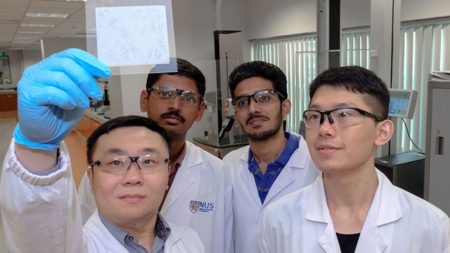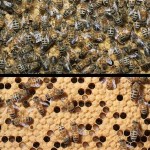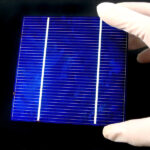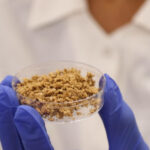August 4, 2019 – In Coleridge’s epic poem, The Rime of the Ancient Mariner, he writes “Water, water everywhere, nor any drop to drink.” Coleridge probably had no idea that he was describing a growing global problem for many countries running out of freshwater resources. And he would have marveled at an invention by a team from the National University of Singapore, who have developed a hydrogel that can capture water from the ocean, and the air, and then release it as fresh.
The material which contains a zinc oxide compound not only captures moisture but releases it without additional energy requirements. And better yet the gel can be cycled more than 1,000 times before losing its absorptive characteristics. The researchers, Dilip Krishna Nandakumar, Yaoxin Zhang, Sai Kishore Ravi, Na Guo, Chun Zhang, and Swee Ching Tan, published their findings in January of this year in the journal Advanced Materials.
They note that what motivated them to find a hygroscopic nanomaterial (one that readily captures moisture from the air, or from saltwater sources), is the growing freshwater crisis around the world exacerbated by anthropogenic climate change and human population growth. The researchers chose a zinc-based compound capable of sustainably harvesting water from humid air to 420% of its own weight. The hydrogel when exposed to natural sunlight and heated to 55 Celsius (131 Fahrenheit), releases its water burden providing energy-less water harvesting which would make it ideal in Developing World countries. A kilogram of the hydrogel can harvest more than 10 liters (2.6 U.S. gallons) of water daily.
In Singapore with its high relative humidity of between 70 and 80%, the air is saturated. This is the ideal environment for air-harvesting freshwater using the gel which can absorb more than 2.5 times its weight in water vapour. The additional benefit is zinc oxide is abundant and cheap. And with no need to add electricity for the gel to work, it has considerable appeal as a solution the world needs presently.
The hydrogel can actually be used as a coating on windows and walls where on the former it would lower room humidity, and on the latter bring down room temperatures. How does it do the latter? When it is absorbing the water it turns from transparent to opaque and can block up to 50% of infrared radiation responsible for heating a room in direct sunlight. How much cooling are we talking about? As much as 7 Celsius (over 12 Fahrenheit) degrees.
Swee Ching Tan, the lead developer of the hydrogel sees the invention “as a floating water-capturing farm” where such an approach “could benefit rural communities where access to clean water remains a challenge,” serving to mitigate the global freshwater crisis.
A number of conducted field tests used floating mats of the hydrogel which once saturated were placed in glass boxes and left to sit in the sunlight. Not only did the hydrogel absorb the water from the sea as advertised, but it also released water vapour which coated the walls of the glass and then ran down the sides to be collected. Temperatures inside the glass boxes reached between 45 and 50 Celsius (113 and 122 Fahrenheit).
The hydrogel may even have other properties which may make it a useful material as a conducting medium in flexible electronics. But consider its primary use and some recent headlines with cities like Cape Town, South Africa, or Sao Paulo, Brazil, almost running out of water, or a story that broke this week about Harare, Zimbabwe, where a drought is causing city residents to line up for hours to get a few pails of water every few days, and you can see just how impactful this invention may prove to be.
















